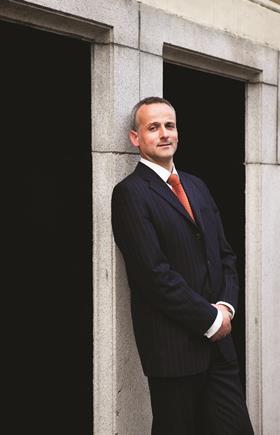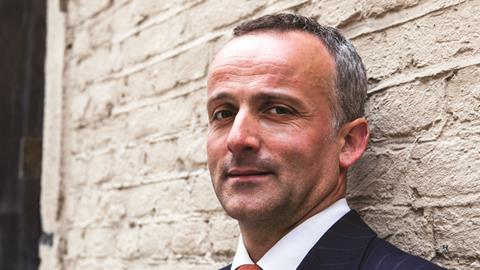Paul Neto leads Vinci Construction UKтАЩs crack special projects squad, which is only interested in the big stuff - major contracts and closing a mighty drop in profits. Portrait by James Bolton
There is more to Vinci Construction UK than meets the eye. A man called Paul Neto for one. He heads a team that was set up five years ago to support the ┬г1.1bn contractorтАЩs building arm - the part of the business that has traditionally made up the lionтАЩs share of work, but the one suffering the most in the tough economic climate compared to VinciтАЩs civil engineering and facilities divisions.
Neto has been managing director of Vinci Construction UK Special Projects since August 2011. The 14-strong core team looks exclusively at front-end procurement, specialising in providing funding or investment, procuring projects over ┬г100m and major frameworks. Once won, they hand over the schemes to the regions to deliver.
This is a crack team, brought together solely to focus on winning billions of pounds of work, adding to NetoтАЩs тАЬopportunity hopperтАЭ, which stands at between ┬г1bn and ┬г2bn at any one time.
Despite the increasingly tough climate for contractors, Neto is convinced he can continue to deliver, even with the public sector cuts: тАЬTimes are certainly tough,тАЭ he says. тАЬBut thatтАЩs why we were brought in - to focus on winning work and support the groupтАЩs UK building division.тАЭ
Furthermore, passing the projects to the regions, and bidding for large framework schemes with work all over the country, means that it is not just London-based firms that benefit from the spoils.
NetoтАЩs hope is for the division to be recognised industry wide: тАЬI want people to say: тАШVinci Special Projects has won a projectтАЩ rather than тАШVinci has won a projectтАЩ so people realise what a difference we make.тАЭ
ThatтАЩs the big question. How much of a difference does the 41-year-old and his team make? Here we find out how far Neto plans to expand the division, whom he wants to work with and how regional SMEs are benefiting from the Special Projects way of working.
The challenge
Vinci saw its UK pre-tax profit fall 48% over the past year - from ┬г39m in 2010 to ┬г19.8m last year as a result of the тАЬdifficult economic climateтАЭ, although turnover for the firm was up 8% to ┬г1.11bn in results for the year to 31 December 2011. The turnover increase mainly comprised growth in the firmтАЩs Taylor Woodrow Division in civil engineering.
The firmтАЩs order book stands at an impressive ┬г1.3bn, with health, education and retail contributing over 75% of contract wins in 2011. And
this is where Special Projects comes in.
The work

The Special Projects division is solely focused on projects over ┬г100m or on frameworks. Procure 21 + and the Ministry of Justice frameworks have been particularly lucrative for the group, bringing in ┬г250m over the past two years.
And he isnтАЩt too bothered about more public sector cuts or the NHS reforms as the pipeline of work in these sectors looks healthy: тАЬWe are the only contractor on all four MoJ frameworks and we have built up a strong reputation on Procure 21+, particularly in the north.
тАЬI am not noticing work drying up, especially in the health sector as we spread our bids across public and private, working for private healthcare facilities developers like Circle, and adapting to bid for work where opportunities are increasing, like care homes.тАЭ
The majority of the ┬г1bn-┬г2bn work available goes to the regions: тАЬOne of the fundamental reasons for having this division is to let regions focus on delivering their business targets.
тАЬThe special projects team is made up of experienced work winners but the jobs are then passed to the regions. We donтАЩt have a long list of projects in London and the South East, which is very unusual for a major contractor currently, especially when 35% of GDP is in this region.тАЭ
Engagement with regions starts early to draw on local expertise and contacts: тАЬAs much as we will be talking to clients and consultants, the regions will be feeding in. They will be having conversations with local clients and may say: тАШHey Paul, I have found an opportunity here, can you help?тАЩ So we donтАЩt end up sitting in Watford trying to hunt something down in Warrington.тАЭ
Work up for grabs
It follows on that with 60% of the work in the regions outside of London, thatтАЩs where most of the opportunities for suppliers, and particularly consultants, are. тАЬThere are always opportunities for new firms,тАЭ says Neto. тАЬAnd the regions will obviously continue to develop new relationships all over the UK. So a regional office can say тАШI think this consulting engineer would be goodтАЩ and being down South we might not know that. So we have a broader reach of potential new firms, inlcluding SMEs accross the country. ItтАЩs a very open door.тАЭ
Open as long as you can deliver what Neto is looking for: тАЬFor me, a lot of it is down to a gut feeling. But also a track record, a strong, reliable organisation that will deliver.тАЭ And with VinciтАЩs BIM team sitting under the special projects umbrella, being technologically advanced helps too
Expansion?
With energy and infrastructure looking like the major areas of work over the next three to five years, is Neto concerned about the future of the groupтАЩs ║├╔л╧╚╔·TV division, with or without the support of special projects? тАЬNo. We are here for the very reason to support that side of the business and weтАЩre doing well. Plus, infrastructure may be where the growth is but each of those projects have building elements. And we will expand across the business divisions where there is an opportunity.тАЭ
And those opportunities look set to go global: тАЬWe want to explore how we can engage with other parts of the Vinci Group to learn from, and help, companies where we have expertise. I want to build up a far-reaching body of work to become the benchmark that all of our peers are measured against. That would be ultimate goal. The pinnacle.тАЭ




























No comments yet